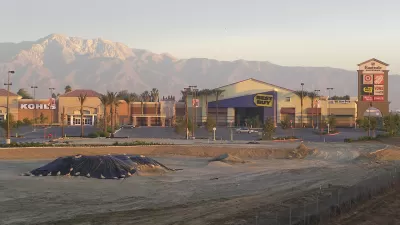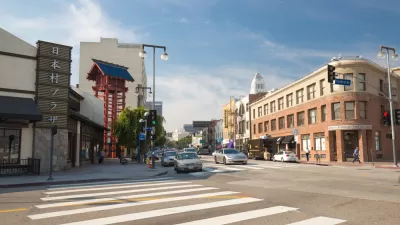The California Natural Resources Agency posted the final version of amendments to the California Environmental Quality Act, enabled by 2013's SB 743, at the end of 2018.

Melanie Curry reports on the long-awaited adoption of California's SB 743—a bill signed in 2013 to reform the California Environmental Quality Act by ending the use of Level of Service as a metric for development impact. Vehicle miles traveled is now the preferred metric. Curry refers to Level of Service as car delay, and environmentalists and smart growth advocates have long noted that it's a strange way to measure environmental impact.
"The [new] rules say that vehicle miles traveled–the amount in distance of automobile travel produced by a project–is a more appropriate measure of transportation impacts than vehicle delay," explains Curry. "Specifically, the new rule states that 'a project’s effect on automobile delay shall not constitute a significant environmental impact.' In addition, development projects within a half-mile of high quality transit are presumed not to have a significant environmental impact."
The bill that passed in 2013 might have shot higher than the final rules produced by the Governor’s Office of Planning and Research, however, after compromises during the rule making process. For instance, "planners will be allowed 'discretion' on which measure to use–so they could choose to stick with the outdated and discredited Level of Service metric," reports Curry.
"The new rules take effect immediately as advisory, but by June 2020 they will apply to all new environmental analyses," according to Curry. For more information on the final bureaucratic actions that put the new rules into advisory effect, see an article posted by Norman F. Carlin, Kevin Ashe, and Eric Moorman on the Pillsbury Law website.
FULL STORY: At Last, New Rules Are Final: Car Delay Is (Sometimes) NOT an Environmental Impact

Maui's Vacation Rental Debate Turns Ugly
Verbal attacks, misinformation campaigns and fistfights plague a high-stakes debate to convert thousands of vacation rentals into long-term housing.

Planetizen Federal Action Tracker
A weekly monitor of how Trump’s orders and actions are impacting planners and planning in America.

In Urban Planning, AI Prompting Could be the New Design Thinking
Creativity has long been key to great urban design. What if we see AI as our new creative partner?

San Francisco Mayor Backtracks on Homelessness Goal
Mayor Dan Lurie ran on a promise to build 1,500 additional shelter beds in the city, complete with supportive services. Now, his office says they are “shifting strategy” to focus on prevention and mental health treatment.

How Trump's HUD Budget Proposal Would Harm Homelessness Response
Experts say the change to the HUD budget would make it more difficult to identify people who are homeless and connect them with services, and to prevent homelessness.

The Vast Potential of the Right-of-Way
One writer argues that the space between two building faces is the most important element of the built environment.
Urban Design for Planners 1: Software Tools
This six-course series explores essential urban design concepts using open source software and equips planners with the tools they need to participate fully in the urban design process.
Planning for Universal Design
Learn the tools for implementing Universal Design in planning regulations.
Gallatin County Department of Planning & Community Development
Heyer Gruel & Associates PA
JM Goldson LLC
Mpact (founded as Rail~Volution)
City of Camden Redevelopment Agency
City of Astoria
Jefferson Parish Government
Camden Redevelopment Agency
City of Claremont



























